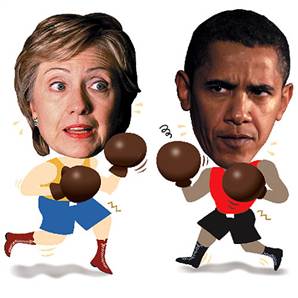Crime: the Campaign & New Policy
21 Feb
Sorry I been gone. I’ve been busy with my job, my other projects, and family shit. But I have been keeping up with what’s goin on in the world.
So one of the things I have grown anxious about is how crime is going to be used in the upcoming election. Listening to Barack’s victory speech in Texas, which he said “As Commander in Chief, my job will be to keep you safe. And I will not hesitate to strike against any that will do us harm.” So now he’s gotta look as tough on national security as John McCain. Pity. It’s this part that is making me a little queasy.
So if Obama nabs the nomination, not only will his ability to “push the button” be called into question, but he will also be scrutinized for how tough on crime he is. So far, his talk about crime has been about how he led mandatory taping of police investigations in the Illinois legislature, and his support of death penalty, racial profiling and mandatory minimum sentencing. But a look at his Senate page on crime is much more frightening. It includes, as his accomplishments, legislation to increase restrictions and surveillance on “sex offenders” to increasing the capacity of local police officers to use technology—I guess for better surveillance. (Talk Left has a great blog entry on Obama and criminal justice issues).
Sigh.
But I hope that he can figure out a way to get through this without using “tough on crime” rhetoric as a selling point. Regardless, there are several high-profile reforms coming down the pike that I hope can move us away from such draconian practices and reduce the numbers of people in prison.
The New York Times reported on a new program in the city to provide young people with therapists who work with the families to help get at the root of the issues instead of sending them to prison:
“When Jacob Rivera, 15, was resentenced in May on an assault conviction, he felt he had received a “blessing.”
Only months earlier he had been sentenced to a year in state custody, and he had already spent weeks bouncing between a juvenile detention center in the Bronx and a residential treatment campus upstate. Two of his older siblings had spent time in those facilities and, he said, had “come out a mess.” He could see his future.
But the court gave him a second chance because his case had not been properly reviewed for inclusion in a new alternative sentencing program, which the city started in February 2007. The program, called the Juvenile Justice Initiative, sends medium-risk offenders back to their families and provides intensive therapy.
The city says that in just a year, it has seen significant success for the juveniles enrolled, as well as cost savings from the reduced use of residential treatment centers.”
Mother Jones has a pretty good news analysis of the fight on the federal level to end mandatory minimum sentencing for crack cocaine:
“Speaking before the Senate Judiciary Subcommittee on Crime and Drugs on Tuesday, U.S. Attorney Gretchen Shappert warned that shorter crack-cocaine sentences will cause a “loss of the public’s trust and confidence in our criminal justice system”—a possibility that is only slightly less troubling than Attorney General Michael Mukasey’s claim that reduced sentences will mean that “1,600 convicted crack dealers, many of them violent gang members, will be eligible for immediate release into communities nationwide.”
These statements are scare tactics aimed at reversing a decision by the U.S. Sentencing Commission, the agency responsible for setting sentencing rules in the federal courts, which has pegged March 3 as the first day federal prisoners doing time for crack offenses are eligible to petition for reduced sentences. This countdown comes just after the Commission’s introduction of less-harsh crack-sentencing standards in November, and the December announcement that this reduction will be applicable to inmates currently incarcerated as well as future offenders. The Justice Department, citing “public safety risks,” is trying to overturn the rule. But giving inmates the chance to obtain shorter sentences won’t spur a mass prison exodus: Judges will still decide which inmates deserve a reduction and which don’t. No one is guaranteed an early release.”
Mother Jones is the shit. They also have a great story on a corporate prison executive whom Bush is appointing to be the trail court judge in Tennessee.
 It seems really strange that the New York Times and the Washington Post would run news stories both taking place in Black beauty shops to talk about th efight for Black women’s vote in South Carolina. But today, they did. Their stories, both accompanied by video, take different points of view on what Black women are thinking about how they are going to vote this year, and on the tactics Clinton and Obama’s machines are using to court their vote.
It seems really strange that the New York Times and the Washington Post would run news stories both taking place in Black beauty shops to talk about th efight for Black women’s vote in South Carolina. But today, they did. Their stories, both accompanied by video, take different points of view on what Black women are thinking about how they are going to vote this year, and on the tactics Clinton and Obama’s machines are using to court their vote.